
Juan Carlos Onganía Carballo was President of Argentina from 29 June 1966 to 8 June 1970. He rose to power as dictator after toppling the president Arturo Illia in a coup d'état self-named Revolución Argentina.

The Justicialist Party is a major political party in Argentina, and the largest branch within Peronism.

The General Confederation of Labor is a national trade union federation in Argentina founded on September 27, 1930, as the result of the merger of the USA and the COA trade unions. Nearly one out of five employed – and two out of three unionized workers in Argentina – belong to the CGT, one of the largest labor federations in the world.
The first conflicts between the Roman Catholic Church and the Argentine government can be traced to the ideas of the May Revolution of 1810. The Tribunal of the Inquisition was suppressed in the territories of the United Provinces of the River Plate on 1813-03-23, and on 4 June the General Assembly declared the state "independent from any ecclesiastical authorities existing outside its territory".
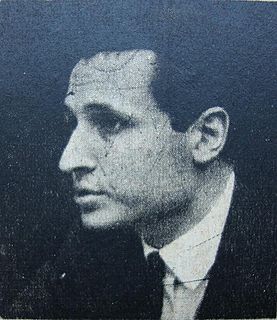
Mariano Grondona is an Argentine lawyer, sociologist, political scientist, essayist and commentator. He has been a journalist for several decades, appearing in print media and on television, and has written several books. He has also taught in several universities, both in Argentina and abroad.
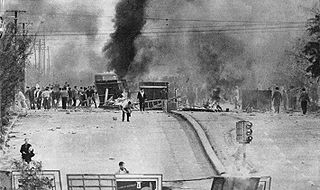
The Cordobazo was a civil uprising in the city of Córdoba, Argentina, at the end of May 1969, during the military dictatorship of General Juan Carlos Onganía, which occurred a few days after the Rosariazo, and a year after the global protests of 1968. Contrary to previous protests, the Cordobazo did not correspond to previous struggles, headed by Marxist workers' leaders, but associated students and workers in the same struggle against the military government.
The Grupo Cine Liberación was an Argentine film movement that took place during the end of the 1960s. It was founded by Fernando Solanas, Octavio Getino and Gerardo Vallejo. The idea of the group was to give rise to historical, testimonial and film-act cinema, to contribute to the debate and offer an open space for dialogue and freedom of expression that was illegal at that time. With strong anti-imperialist ideas, he harshly criticized Peronism and neocolonialism. In the subsequent years other films directors revolved around the active core of the Cine Liberación group.
Jorge Gianonni was an independent Argentine filmmaker.

José Alonso was an Argentine politician and trade-unionist.
The CGTA was an offshoot of the General Confederation of Labour created during the Normalisation Congress of the CGT of 28–30 March 1968, and which lasted until 1972.

Argentine Revolution was the name given by its leaders to a military coup d'état which overthrew the government of Argentina in June 1966 and began a period of military dictatorship by a junta from then until 1973.
The history of Argentina can be divided into four main parts: the pre-Columbian time or early history, the colonial period (1530–1810), the period of nation-building (1810–1880), and the history of modern Argentina.
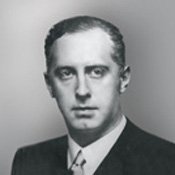
Roberto Noble was an Argentine politician, journalist and publisher, perhaps best known for having founded Clarín, long Argentina's leading news daily and the most or second-most circulated in the Spanish-speaking world.
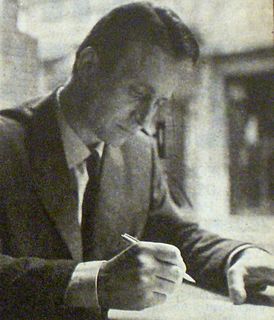
Raimundo José Ongaro was an Argentine union leader. He was secretary general of the General Confederation of Labour of the Argentines (CGTA) between 1968 and 1974.

Carlos Mugica was an Argentine Roman Catholic priest and activist.

Juan Domingo Perón was an Argentine Army general and politician. After serving in several government positions, including Minister of Labour and Vice President of a military dictatorship, he was elected President of Argentina three times, serving from June 1946 to September 1955, when he was overthrown by the Revolución Libertadora, and then from October 1973 until his death in July 1974.
In Argentina, there were six coups d'état during the 20th century: in 1930, 1943, 1955, 1962, 1966 and 1976. The first four established interim dictatorships, while the last two established dictatorships of permanent type on the model of a bureaucratic-authoritarian state. The latter conducted a Dirty War in the line of State terrorism, in which human rights were systematically violated and there were tens of thousands of forced disappearances.

Jerónimo José Podestá was an Argentine Catholic bishop.
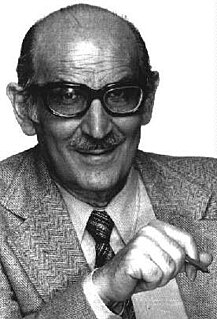
Fernando Nadra was an Argentine lawyer, journalist and public speaker. He was one of the most important leaders of the Partido Comunista Argentino and, from his Marxist ideological perspective, took part in most of the important political debates of his time. He stood out from other left-wing leaders of his time for his abilities as an organizer and collective activist, and his numerous attempts to promote agreement among different political sectors through pluralistic dialogue.

Editorial Haynes was an Argentine publishing company founded by Alberto M. Haynes in 1904. The publisher released several magazines such as El Hogar, Mundo Deportivo, Mundo Argentino, Mundo Agrario, Mundo Infantil, and newspaper El Mundo, among other imprints.
















